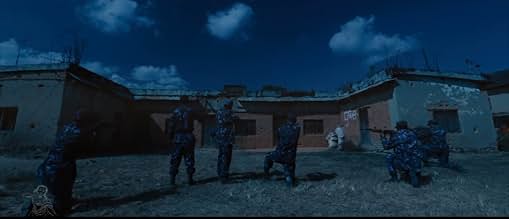Ajouter une intrigue dans votre langueSet in the early 2000s, Uma is a story about Uma, her brother Milan and their widow mother living in rural Nepal during the Maoist insurgency.Set in the early 2000s, Uma is a story about Uma, her brother Milan and their widow mother living in rural Nepal during the Maoist insurgency.Set in the early 2000s, Uma is a story about Uma, her brother Milan and their widow mother living in rural Nepal during the Maoist insurgency.
- Réalisation
- Scénario
- Casting principal
Avis à la une
Here's a 610-word review of the film "Interstellar":
Interstellar: A Cosmic Odyssey of Love and Loss
Christopher Nolan's "Interstellar" is not just a science fiction film; it's a profound exploration of human existence, the power of love, and the enduring spirit of hope in the face of impending doom. Set in a dystopian future where Earth faces imminent environmental collapse, the film follows a group of astronauts on a perilous mission to find a new home for humanity among the stars.
At the heart of "Interstellar" lies a poignant portrayal of father-daughter love. Matthew McConaughey delivers a stellar performance as Cooper, a former pilot turned farmer, grappling with the responsibility of leaving his children behind to embark on a potentially one-way journey. The emotional core of the film resonates deeply, exploring themes of sacrifice, regret, and the enduring bonds of family. Anne Hathaway shines as Dr. Brand, a brilliant scientist driven by a unwavering belief in humanity's future. Their dynamic, while occasionally fraught with tension, ultimately fuels the mission and provides a sense of human connection amidst the vast, impersonal cosmos.
Nolan masterfully blends hard science with philosophical musings, creating a visually stunning and intellectually stimulating cinematic experience. The film delves into complex scientific concepts like relativity, wormholes, and black holes, presenting them in a way that is both accessible and awe-inspiring. The visual effects are breathtaking, particularly the depiction of Gargantua, a supermassive black hole, and the mesmerizing portrayal of time dilation. The soundtrack, composed by Hans Zimmer, is equally impressive, soaring and melancholic, perfectly capturing the film's emotional depth and cosmic grandeur.
However, "Interstellar" is not without its flaws. Some may find the pacing uneven, with certain segments feeling slower than others. The ending, while emotionally resonant, may leave some viewers feeling unsatisfied or unconvinced by its resolution. Additionally, the film's reliance on deus ex machina moments, particularly in the final act, might detract from the overall sense of realism.
Despite these minor shortcomings, "Interstellar" remains a cinematic masterpiece. It's a film that stays with you long after the credits roll, prompting reflection on profound questions about our place in the universe, the importance of human connection, and the enduring power of hope. Nolan's ambitious vision, coupled with stellar performances and breathtaking visuals, creates an unforgettable cinematic experience that transcends the boundaries of science fiction.
"Interstellar" is a testament to the power of storytelling to explore the deepest human emotions and inspire wonder about the cosmos. It's a film that will continue to captivate audiences for years to come, reminding us of our resilience, our capacity for love, and the unwavering human spirit that drives us to reach for the stars.
At the heart of "Interstellar" lies a poignant portrayal of father-daughter love. Matthew McConaughey delivers a stellar performance as Cooper, a former pilot turned farmer, grappling with the responsibility of leaving his children behind to embark on a potentially one-way journey. The emotional core of the film resonates deeply, exploring themes of sacrifice, regret, and the enduring bonds of family. Anne Hathaway shines as Dr. Brand, a brilliant scientist driven by a unwavering belief in humanity's future. Their dynamic, while occasionally fraught with tension, ultimately fuels the mission and provides a sense of human connection amidst the vast, impersonal cosmos.
Nolan masterfully blends hard science with philosophical musings, creating a visually stunning and intellectually stimulating cinematic experience. The film delves into complex scientific concepts like relativity, wormholes, and black holes, presenting them in a way that is both accessible and awe-inspiring. The visual effects are breathtaking, particularly the depiction of Gargantua, a supermassive black hole, and the mesmerizing portrayal of time dilation. The soundtrack, composed by Hans Zimmer, is equally impressive, soaring and melancholic, perfectly capturing the film's emotional depth and cosmic grandeur.
However, "Interstellar" is not without its flaws. Some may find the pacing uneven, with certain segments feeling slower than others. The ending, while emotionally resonant, may leave some viewers feeling unsatisfied or unconvinced by its resolution. Additionally, the film's reliance on deus ex machina moments, particularly in the final act, might detract from the overall sense of realism.
Despite these minor shortcomings, "Interstellar" remains a cinematic masterpiece. It's a film that stays with you long after the credits roll, prompting reflection on profound questions about our place in the universe, the importance of human connection, and the enduring power of hope. Nolan's ambitious vision, coupled with stellar performances and breathtaking visuals, creates an unforgettable cinematic experience that transcends the boundaries of science fiction.
"Interstellar" is a testament to the power of storytelling to explore the deepest human emotions and inspire wonder about the cosmos. It's a film that will continue to captivate audiences for years to come, reminding us of our resilience, our capacity for love, and the unwavering human spirit that drives us to reach for the stars.
A brother, weighed down with his police duties, has to shoot his sister who is a rebel. In the wake of the Maoist Insurgency, we witness the vulnerability of relationships and the results of a wasted war.
Uma (Reecha Sharma) is represented as a castaway, she drifts away during the course of the movie. When we first meet her, she has an inquiring view on everything. She pens provocative lines about the blazing political disorder in her country. And in poetry gatherings, hosted by her mentor Sunil sir, she advocates the pursuit of equality in her rhymes. For her, Sunil sir is more of a father figure than a teacher. Uma nestles in with her overtly concerned brother and an ailing mother. Her brother Milan (Saugat Malla) is a dutiful cop. He always tries to restrict his sister according to his terms but then, it only takes him few minutes to easily put up with his sister's whims. Her mother (Mithila Sharma) is equally protective of both of her children. In them, there lies a standard definition of a "happy family".
An engineering drop-out, Anil (Prawin Khatiwada), comes to Uma's place. He is poised with socialism and is determined to bring a social wave out of the grassroots. Anil has an almost hypnotic impression on Uma. Together they read the works of Devkota and mingle their romance with revolution. With Sunil sir, they both adopt the literary course to squeeze out the frustration, discrimination and exploitation that the state has dumped onto its citizens. These teasing acts, unfortunately, jerk the governmental watchdogs, who falsely accuse Sunil sir for being a Maoist and later, they gun him down. This initial event proves to be a reference point that dictates Uma's wreckage throughout the entirety of the film.
We hide behind her back as she transitions as a Maoist cadre. Inflicted by the fluctuating events in her life, she's exhausted but hasn't gone numb. She gets a political identity and strives to significance instead of lingering as a Lost Soul. But she's still haunted by the memories of her family and she reminisces without any determination to return back.
Tsering Rhitar Sherpa moves the story by testing Uma's endurance, in almost every scene. He doesn't let any frame go into wastage. Uma paces actively with the story's flow, which makes this two hours and odd minutes long film engaging and thoroughly mesmerizing. The screenplay is crafty and tones down the violence and murk to churn out a genuine, crowd-friendly drama. With Uma, I was assured that there is a commercial way to show a realistic story in its authenticity. Kudos to Tshering!
Saugat and Reecha flawlessly nudge into their characters. Every time when they share the screen, especially in the later scenes, there are vibes of conflicts that depict both of their vicarious sufferings. Also, the supporting characters are etched distinctively and have so much to say. Thus, the film remains good-looking and daring.
At its core Uma is an odyssey of a young girl, who once happened to have an affectionate family, a career plan and a feeble sense of reality. Her journey, however, is shaped up by strong male counterparts. It is essential to observe that Uma never makes her own decisions; she randomly surges into the choices these people make for her. This is the stinging allegory that remains with you after you've watched Uma.
Uma (Reecha Sharma) is represented as a castaway, she drifts away during the course of the movie. When we first meet her, she has an inquiring view on everything. She pens provocative lines about the blazing political disorder in her country. And in poetry gatherings, hosted by her mentor Sunil sir, she advocates the pursuit of equality in her rhymes. For her, Sunil sir is more of a father figure than a teacher. Uma nestles in with her overtly concerned brother and an ailing mother. Her brother Milan (Saugat Malla) is a dutiful cop. He always tries to restrict his sister according to his terms but then, it only takes him few minutes to easily put up with his sister's whims. Her mother (Mithila Sharma) is equally protective of both of her children. In them, there lies a standard definition of a "happy family".
An engineering drop-out, Anil (Prawin Khatiwada), comes to Uma's place. He is poised with socialism and is determined to bring a social wave out of the grassroots. Anil has an almost hypnotic impression on Uma. Together they read the works of Devkota and mingle their romance with revolution. With Sunil sir, they both adopt the literary course to squeeze out the frustration, discrimination and exploitation that the state has dumped onto its citizens. These teasing acts, unfortunately, jerk the governmental watchdogs, who falsely accuse Sunil sir for being a Maoist and later, they gun him down. This initial event proves to be a reference point that dictates Uma's wreckage throughout the entirety of the film.
We hide behind her back as she transitions as a Maoist cadre. Inflicted by the fluctuating events in her life, she's exhausted but hasn't gone numb. She gets a political identity and strives to significance instead of lingering as a Lost Soul. But she's still haunted by the memories of her family and she reminisces without any determination to return back.
Tsering Rhitar Sherpa moves the story by testing Uma's endurance, in almost every scene. He doesn't let any frame go into wastage. Uma paces actively with the story's flow, which makes this two hours and odd minutes long film engaging and thoroughly mesmerizing. The screenplay is crafty and tones down the violence and murk to churn out a genuine, crowd-friendly drama. With Uma, I was assured that there is a commercial way to show a realistic story in its authenticity. Kudos to Tshering!
Saugat and Reecha flawlessly nudge into their characters. Every time when they share the screen, especially in the later scenes, there are vibes of conflicts that depict both of their vicarious sufferings. Also, the supporting characters are etched distinctively and have so much to say. Thus, the film remains good-looking and daring.
At its core Uma is an odyssey of a young girl, who once happened to have an affectionate family, a career plan and a feeble sense of reality. Her journey, however, is shaped up by strong male counterparts. It is essential to observe that Uma never makes her own decisions; she randomly surges into the choices these people make for her. This is the stinging allegory that remains with you after you've watched Uma.
Meilleurs choix
Connectez-vous pour évaluer et suivre la liste de favoris afin de recevoir des recommandations personnalisées
Détails
Box-office
- Budget
- 5 500 000 NPR (estimé)
- Durée2 heures 20 minutes
- Couleur
Contribuer à cette page
Suggérer une modification ou ajouter du contenu manquant



















